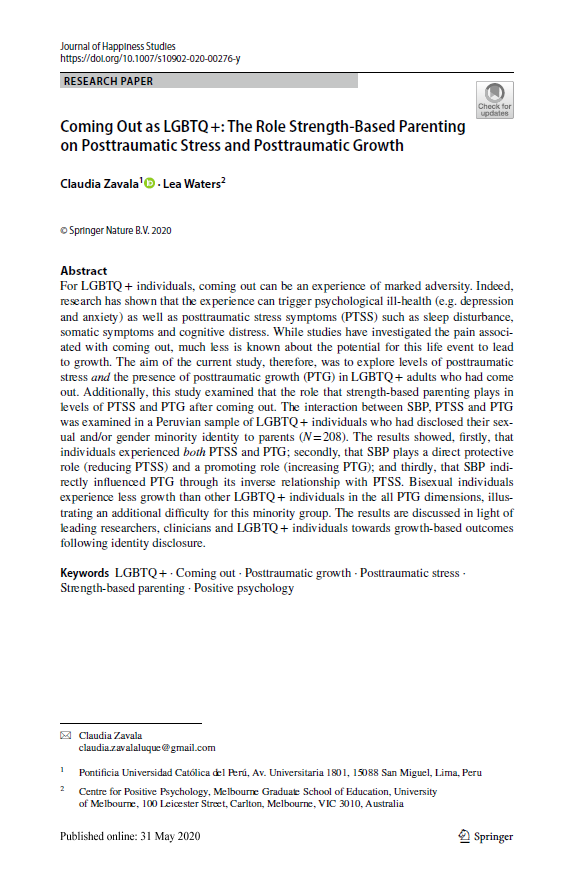
The role of strength-based parenting, posttraumatic stress, and event exposure on posttraumatic growth in flood survivors
Determining how to promote positive psychological outcomes for survivors of floods is necessary, especially for developing countries. This study found that strength-based parenting promoted positive transformation after a flood, even in individuals who struggled with high stress. This has important
implications for practice as psychological interventions for individuals and families, as well as community-based interventions, can seek to center strength-based approaches to promote positive outcomes after these events.

Collective wellbeing and posttraumatic growth during COVID-19: how positive psychology can help families, schools, workplaces and marginalized communities
Positive psychology approaches have been shown to play a vital role in protecting mental health in times of challenge and are, therefore, important to include when studying the psychological
outcomes of COVID-19. While existing research has focused on individual psychological health, this paper focuses on collective wellbeing and collective posttraumatic growth, with the aim of
more clearly identifying the positive experiences and potential for positive growth for key institutions in our society during the pandemic. A range of positive psychology interventions for families,
schools, workplaces, and clinical psychology are presented. The paper then considers how three broad-reaching phenomena existing in our wider society (i.e., arts and culture, eco-connection, and wellbeing literacy) can be used to boost collective wellbeing. A positive systems approach to understand civilian responses to the pandemic together with an examination of the role that positive psychology can play in supporting marginalized groups are also discussed.

Stress-related growth in adolescents returning to school after COVID-19 school closure
The move to remote learning during COVID-19 has impacted billions of students. While research shows that school closure, and the pandemic more generally, has led to student distress, the possibility that these disruptions can also prompt growth in is a worthwhile question to investigate. The current study examined stress-related growth (SRG) in a sample of students returning to campus after a period of COVID-19 remote learning (n = 404, age = 13–18). The degree to which well-being skills were taught at school (i.e., positive education) before the COVID-19 outbreak and student levels of SRG upon returning to campus was tested via structural equation modeling. Positive reappraisal, emotional processing, and strengths use in students were examined as mediators. The model provided a good fit [χ2 = 5.37, df = 3, p = 0.146, RMSEA = 0.044 (90% CI = 0.00–0.10), SRMR = 0.012, CFI = 99, TLI = 0.99] with 56% of the variance in SRG explained. Positive education explained 15% of the variance in cognitive reappraisal, 7% in emotional processing, and 16% in student strengths use during remote learning. The results are discussed using a positive education paradigm with implications for teaching well-being skills at school to foster growth through adversity and assist in times of crisis.

Coming out as LGBTQ +: The role strength‑based parenting on posttraumatic stress and posttraumatic growth
For LGBTQ + individuals, coming out can be an experience of marked adversity. Indeed, research has shown that the experience can trigger psychological ill-health (e.g. depression and anxiety) as well as posttraumatic stress symptoms (PTSS) such as sleep disturbance, somatic symptoms and cognitive distress. While studies have investigated the pain associated with coming out, much less is known about the potential for this life event to lead
to growth. The aim of the current study, therefore, was to explore levels of posttraumatic stress and the presence of posttraumatic growth (PTG) in LGBTQ + adults who had come out. Additionally, this study examined that the role that strength-based parenting plays in
levels of PTSS and PTG after coming out. The interaction between SBP, PTSS and PTG was examined in a Peruvian sample of LGBTQ + individuals who had disclosed their sexual and/or gender minority identity to parents (N = 208). The results showed, firstly, that
individuals experienced both PTSS and PTG; secondly, that SBP plays a direct protective role (reducing PTSS) and a promoting role (increasing PTG); and thirdly, that SBP indirectly influenced PTG through its inverse relationship with PTSS. Bisexual individuals
experience less growth than other LGBTQ + individuals in the all PTG dimensions, illustrating an additional difficulty for this minority group. The results are discussed in light of leading researchers, clinicians and LGBTQ + individuals towards growth-based outcomes following identity disclosure.




